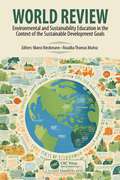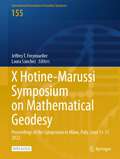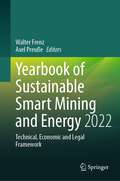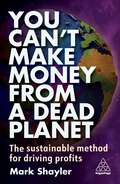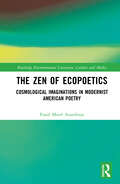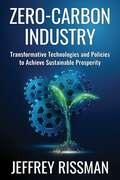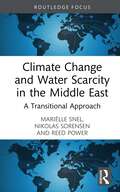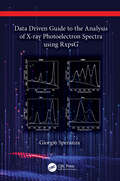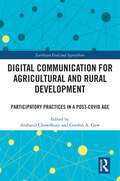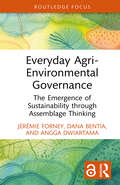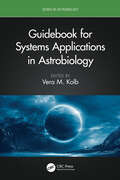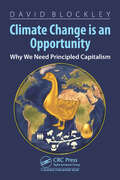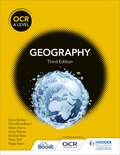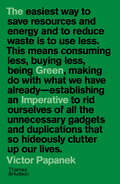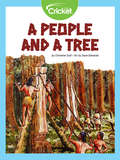- Table View
- List View
The World Is Ours to Cherish: A Letter to a Child
by Mary Annaïse HeglarThis hopeful picture book--written in the style of a letter--gives kids an honest take on climate change and urges them to band together to help the planet.The world is a big, beautiful place full of natural wonders--everything from bees to rainfall can seem magical.The world is also changing. Climate change has already had a devastating effect on the planet.But it's not too late! If we work together and show a little more care, both for the environment and each other, we can keep this world beautiful.This moving debut from climate writer Mary Annaïse Heglar is perfect for budding environmentalists and anyone in need of a little hope for the future of our planet.
World Review: Environmental and Sustainability Education in the Context of the Sustainable Development Goals
by Marco Rieckmann Rosalba Thomas MuñozThe global landscape of education has been reshaped by the COVID-19 pandemic, revealing the various challenges faced by countries worldwide. This book provides a comprehensive exploration of Environmental and Sustainability Education (ESE) across different countries, offering unique insights into their histories, challenges, achievements, and future ESE needs. From Africa to Oceania, the book delves into the vital role of ESE in the context of the UN Sustainable Development Goals. It highlights the diverse national discourses and the flexibility required to deliver effective global education programs. ESE practitioners, researchers, and policymakers worldwide will find inspiration and invaluable perspectives in this book.
X Hotine-Marussi Symposium on Mathematical Geodesy: Proceedings of the Symposium in Milan, Italy, June 13-17, 2022 (International Association of Geodesy Symposia #155)
by Jeffrey T. Freymueller Laura SánchezThis open access volume contains the proceedings of the X Hotine-Marussi Symposium on Mathematical Geodesy which was held from 13 to 17 June 2022 at the Politecnico di Milano, Milan, Italy. Since 2006 the series of the Hotine-Marussi Symposia has been under the responsibility of the Inter-Commission Committee on Theory (ICCT) within the International Association of Geodesy (IAG). The ICCT organized the last five Hotine-Marussi Symposia held in Wuhan (2006), Rome (2009, 2013 and 2018), and Milan (2022). The overall goal of the ICCT and Hotine-Marussi Symposia has always been to advance geodetic theory which is indeed documented by the 22 research articles published in these proceedings. The jubilee X Hotine-Marussi Symposium was organized in 10 topical sessions covering all parts of geodetic theory including reference frames, gravity field modelling, adjustment theory, height systems, time series analysis, or advanced numerical methods. In total, 60 participants attended the Symposium who delivered 62 oral and 18 poster presentations. During a special session, five invited speakers discussed two basic concepts of physical geodesy – geoid and quasigeoid.
Yearbook of Sustainable Smart Mining and Energy 2022: Technical, Economic and Legal Framework (Yearbook of Sustainable Smart Mining and Energy - Technical, Economic and Legal Framework #2)
by Walter Frenz Axel PreußeThis book covers several aspects of the application of Sustainable Development Goals to mining related subjects. The included works range from methods to assess and implement sustainability to discussions of legal impacts and relations as well as technological developments and outlooks. First, the challenges and opportunities of clean energy transition in the African mining sector are described. With regard to the assessment of sustainable developments, this book includes the applications of the sieving method, the concept of thermodynamics and the United Nations Framework Classification to mining projects and case studies. The implementation of Sustainable Development Goals into academic project work and education of geo-engineers is covered as well. The legal topics contain discussions of corporate climate liabilities and extraterritorial legal responsibilities as well as an analysis of the impact of the German Federal Constitutional Court's climate decision. Important mining aspects and technological developments like proactive water management, sustainable approaches to mine closure and implementation of ventilation on demand in underground mines are described. In addition, the state and potential of the Mongolian raw materials industry is covered. The Sustainable Smart Mining and Energy Yearbook is not only aimed at researchers and professionals, but at all who want to get an overview of current important technical and legal topics in this field.
You Can’t Make Money From a Dead Planet: The Sustainable Method for Driving Profits
by Mark ShaylerDoing good is no longer a luxury or a 'nice to have', it's a necessity.While businesses, both big and small, have undoubtedly caused the majority of our environmental and sustainability problems, only they can solve these issues at scale. You Can't Make Money from a Dead Planet looks at the challenges we face and shows how business needs to change in order to be the driver of the solution. Bestselling author and sustainability strategist Mark Shayler explains why there is no contradiction between being profitable and doing the right thing for the planet and doing the right thing for your customers. Providing the insights, the enthusiasm and the tools to align your business with sustainability, it blends explanations of the challenges that we face, with stories from those business that have excelled in sustainability. Exploring current sustainability approaches and trends including net-zero, circular economy, ESG, B-Corps, zero waste and environmental management systems, You Can't Make Money From a Dead Planet explains, debunks and helps you navigate the sustainable agenda while growing your business.
The Zen of Ecopoetics: Cosmological Imaginations in Modernist American Poetry (Routledge Environmental Literature, Culture and Media)
by Enaiê Mairê AzambujaThis book is the first comprehensive study investigating the cultural affinities and resonances of Zen in early twentieth-century American poetry and its contribution to current definitions of ecopoetics, focusing on four key poets: William Carlos Williams, Marianne Moore, Wallace Stevens, and E.E. Cummings. Bringing together a range of texts and perspectives and using an interdisciplinary approach that draws on Eastern and Western philosophies, including Zen and Taoism, posthumanism and new materialism, this book adds to and extends the field of ecocriticism into new debates. Its broad approach, informed by literary studies, ecocriticism, and religious studies, proposes the expansion of ecopoetics to include the relationship between poetic materiality and spirituality. It develops ‘cosmopoetics’ as a new literary-theoretical concept of the poetic imagination as a contemplative means to achieving a deeper understanding of the human interdependence with the non-human. Addressing the critical gap between materialism and spirituality in modernist American poetry, The Zen of Ecopoetics promotes new forms of awareness and understanding about our relationship with non-human beings and environments. It will be of interest to scholars, researchers, and students in ecocriticism, literary theory, poetry, and religious studies.
Zero-Carbon Industry: Transformative Technologies and Policies to Achieve Sustainable Prosperity (Center on Global Energy Policy Series)
by Jeffrey RissmanThe power sector and transportation tend to dominate conversations about climate change, but there’s an under-the-radar source of climate pollution that must be addressed: industry. Globally, industrial activity is responsible for one-third of human-caused greenhouse gas emissions. Though industry is a major emitter, it is essential for producing the tools we need to fight climate change—like wind turbines, solar panels, and electric vehicles—and for meeting our everyday needs. How can industry eliminate its climate pollution while supplying transformational technologies?This book delivers a first-of-its-kind roadmap for the zero-carbon industrial transition, spotlighting the breakthrough innovations transforming the manufacturing sector and the policies that can accelerate this global shift. Jeffrey Rissman illustrates the scope of the challenge, diving into the workings of heavy polluters like steel, chemicals, plastics, cement, and concrete. He examines ways to affordably decarbonize manufacturing, such as electrifying industrial processes, using hydrogen, deploying carbon capture and storage, and growing material efficiency with lightweighting and 3D printing. But technologies are only part of the picture. Enacting the right policies—including financial incentives, research and development support, well-designed carbon pricing, efficiency and emissions standards, and green public procurement—can spur investment and hasten emissions reductions. Rissman provides a framework to ensure that the transition to clean industry enhances equity, health, and prosperity for communities worldwide.Engaging and comprehensive, Zero-Carbon Industry is the definitive guide to decarbonizing the vast—yet often overlooked—global industrial sector.
Climate Change and Water Scarcity in the Middle East: A Transitional Approach (Earthscan Studies in Water Resource Management)
by Mariëlle Snel Nikolas Sorensen Reed PowerAs water's significance as a geopolitical resource is poised to surpass that of oil, this book explores the adaptation of Water, Sanitation, and Hygiene (WASH) services in the Middle East to climate change challenges, leveraging the Humanitarian-Development-Peace nexus for a sustainable transition and resilient solutions. Delving into the humanitarian and development sectors across the region, the authors advocate for a transformative approach towards more innovative, integrated, and localized programming. It draws a parallel between the increasing global shift in humanitarian needs, as starkly revealed by the COVID-19 pandemic, and the ongoing devastation wrought by climate change, particularly through water-related crises such as flooding, drought, famine, and conflict. The authors stress the urgent need for adaptive and sustainable strategies that can swiftly respond to evolving climate challenges. This book argues that there is currently a window of opportunity for WASH practitioners to develop broader, multi-sectoral experiences to meet these challenges. Drawing on discussions with humanitarian and development practitioners and new contemporary case studies, this book analyzes the financial, institutional, environmental, technical, and socio-cultural considerations for creating sustainable WASH services in transition. The narrative emphasizes the urgent need for a Humanitarian-Development-Peace nexus approach, advocating for multisectoral collaboration and localization as vital to addressing protracted crises and climate change's escalating threats. It calls for a strategic shift towards organizations that merge immediate humanitarian aid with sustainable development, enhancing local capacities for effective, enduring solutions. The authors conclude by outlining practical actions for humanitarian and development organizations at the local, national, regional, and global levels to support effective integrated and transitional WASH programming in the future.
Data Driven Guide to the Analysis of X-ray Photoelectron Spectra using RxpsG
by Giorgio SperanzaThis book provides a theoretical background to X-ray photoelectron spectroscopy (XPS) and a practical guide to the analysis of the XPS spectra using the RxpsG software, a powerful tool for XPS analysis. Although there are several publications and books illustrating the theory behind XPS and the origin of the spectral feature, this book provides an additional practical introduction to the use of RxpsG. It illustrates how to use the RxpsG software to perform specific key operations, with figures and examples which readers can reproduce themselves. The book contains a list of theoretical sections explaining the appearance of the various spectral features (core‑lines, Auger components, valence bands, loss features, etc.). They are accompanied by practical steps, so readers can learn how to analyze specific spectral features using the various functions of the RxpsG software. This book is a useful guide for researchers in physics, chemistry, and material science who are looking to begin using XPS, in addition to experienced researchers who want to learn how to use RxpsG. In the digital format, the spectral data and step-by-step indications are provided to reproduce the examples given in the textbook. RxpsG is a free software for the spectral analysis. Readers can find the installation information and download the package from https://github.com/GSperanza/ website. RxpsG was developed mainly by Giorgio Speranza with the help of his colleague dr. Roberto Canteri working at Fondazione Bruno Kessler. Key Features: Simplifies the use of RxpsG, how it works, and its applications. Demonstrates RxpsG using a reproduction of the graphical interface of RxpsG, showing the steps needed to perform a specific task and the effect on the XPS spectra. Accessible to readers without any prior experience using the RxpsG software. Giorgio Speranza is Senior Researcher at Fondazione Bruno Kessler – Trento Italy, Associate Member of the Italian National Council of Research, and Associate Member of the Department of Industrial Engineering at the University of Trento, Italy.
Digital Communication for Agricultural and Rural Development: Participatory Practices in a Post-COVID Age (Earthscan Food and Agriculture)
by Gordon A. GowThis volume presents insights on the challenges of digital communication and participation in agricultural and rural development. The COVID-19 pandemic has revealed that digital technology and mediated participation is more important and essential in managing ongoing communication for development projects than ever before. However, it has also underscored the various challenges and gaps in knowledge with digital participatory practices, including the further exclusion of marginalized groups and those with limited access to digital technology. The book considers how the concept of participation has been transformed by the realities of the pandemic, reflecting on essential principles and practical considerations of communication for development and social change, particularly in the context of global agriculture and food security, the well-being of rural communities, and evolving environmental challenges, such as climate change. In gathering these insights, this volume highlights lessons for the future of participatory development in communication for development and social change processes. This volume will be of great interest to students and scholars of agricultural and rural development, communication for development, digital communication, and sustainable development more broadly.
Environmental Economics and Natural Resource Management
by David A. AndersonThe tools of environmental economics guide policymakers as they weigh development against nature, present against future, and certain benefits against uncertain consequences. The policies and research findings explained in this textbook are relevant to decisions made daily by individuals, firms, and governments. This textbook offers instructors and students a user-friendly, relevant, and up-to-date introduction to these topics while covering recent advancements in the field and significant political and economic changes.The book has been thoroughly updated while retaining the story-based narratives and visual emphasis of previous editions, capturing students’ attention with full-color photos, graphs, and illustrations. This sixth edition includes: Updated coverage of international environmental regulations, the effects of the COVID-19 pandemic on the environment, the effects of war on the environment, recent environmental summits and agreements, the evolving energy and transportation sectors, and trailblazing policies and research Expanded coverage of environmental issues and approaches in underrepresented countries and continents New discussions of EV batteries, populist leaders, carbon leakage, food waste, and ecological resilience Revised digital supplements, including a solutions guide, PowerPoints, and sample tests. Environmental Economics and Natural Resource Management promotes environmental and economic literacy with policy-oriented, application-based content delivered in concise, accessible discussions. Through its engaging approach, the text brings the economic way of thinking into discussions of personal, community, corporate, and government activities that affect environmental assets and the quality of life.
Everyday Agri-Environmental Governance: The Emergence of Sustainability through Assemblage Thinking (Routledge Focus on Environment and Sustainability)
by Jérémie Forney Dana Bentia Angga DwiartamaRevitalising the way the social sciences question agri-environmental governance, this book introduces "the everyday governance approach" as a means to improving the sustainability of agriculture and food systems.The "everyday" refers to localised practices, specific networks, and practical norms that emerge in a process of interaction, translation, and reinterpretation. The authors build this approach on assemblage thinking and theory, which focuses on the collective production of the social through complex sets of connections. For this reason, assemblage thinking becomes a particularly productive guide in exploring how everyday governance is co-produced in the interaction between numerous social processes involving a diversity of actors and instruments. The authors navigate between original and contrasting case studies from Switzerland, Indonesia, and the European Union in order to reorient attention to the transformative nature of governance, which they locate along four different dimensions of the everyday: (1) the interdependence of instruments within a wider governance assemblage; (2) the uncertainty and unpredictability of effects in agri-environmental governance; (3) the distributed nature of agency and its implication for power relations; (4) the importance of capacities in the transformation of agri-food systems. This book calls for a redesigning of agri-environmental governance that should move away from the setting of fix and precise objectives and solutions, and rather aim for a consolidation of sound foundations on which desirable futures can emerge.The book will be an essential read for students and scholars interested in sustainable agriculture and food systems, governance modes and approaches, and sustainability more broadly.
Guidebook for Systems Applications in Astrobiology (Series in Astrobiology)
by Vera M. KolbThis book addresses the timely subject of systems applications in astrobiology. It demonstrates how astrobiology – a multidisciplinary, interdisciplinary, and transdisciplinary field of science – can benefit from adopting the systems approach. Astrobiology draws upon its founding sciences, such as astronomy, physics, chemistry, biochemistry, geology, and planetary sciences. However, astrobiologists can encounter difficulties working across these fields. The systems approach, we believe, is the best contemporary approach to consider astrobiology holistically. The approach is currently used in other fields, such as engineering, which uses systems analysis routinely. Such an approach needs to be learned, both in principle and through examples, from the field. This book features chapters from experts across the field of astrobiology who have applied the systems approach. It will be a valuable guide for astrobiology students at the advanced undergraduate and graduate levels, in addition to researchers in the field, both in academia and the space industry. Key Features: Offers a unique and novel approach to studying and understanding astrobiology Encourages astrobiologists to apply a holistic systems approach to their work, rather than being bogged down in details Imparts practical knowledge to readers which can be adopted in different research and job opportunities in the field of astrobiology Vera M. Kolb obtained degrees in chemical engineering and organic chemistry from Belgrade University, Serbia, and earned her PhD in organic chemistry from Southern Illinois University, Carbondale, Illinois, United States. Following a 30-year career, she is Professor Emerita of Chemistry at the University of Wisconsin-Parkside, Kenosha, Wisconsin. During her first sabbatical leave with the NASA Specialized Center of Research and Training (NSCORT) in Astrobiology, she conducted research with Dr. Leslie Orgel at the Salk Institute and Prof. Stanley Miller at UC San Diego. Her second sabbatical was with Prof. Joseph Lambert at Northwestern University, where she studied sugar silicates and their potential astrobiological relevance. She is credited for authoring over 160 publications, in the fields of organic and medicinal chemistry, green chemistry, and astrobiology, including several books. Recently, she authored Green Organic Chemistry and Its Interdisciplinary Applications (CRC 2016). In the astrobiology field, she edited Astrobiology: An Evolutionary Approach (CRC 2015) and Handbook of Astrobiology (CRC 2019). She co-authored (with Benton C. Clark) Astrobiology for a General Reader: A Questions and Answers Approach (CSP 2020) and Systems Approach to Astrobiology (CRC 2023).
Climate Change is an Opportunity: Why We Need Principled Capitalism
by David BlockleyWe have an imperative, as never before, to change our ways. Climate change is presenting the entire human race with its greatest ever existential challenge. Like many I feel a growing sense of looming disaster. Yes, we are making some progress, but past agreements are not delivering. In this book I put a case for a new form of principled capitalism based on moral principles rather than utility and profit. I propose ten pillars that include systems thinking as citizens of the world and embracing Modern Monetary theory to guide decisions about macroeconomics and national debt.
OCR A Level Geography Third Edition
by David Barker Michael Raw Helen Harris Andy Palmer Peter Stiff Nigel Yates Chris BroadbentHelp your students to develop the geographical skills and knowledge they need to succeed using this new Edition Student book, which includes new case studies and practice questions. Written by our expert author team, the new edition is structured to provide support for A-Level Geography learners of all abilities. The book includes:· Activities and regular review questions to reinforce geographical knowledge and build up core geographical skills· Clear explanations to help students to grapple with tricky geographical concepts and grasp links between topics· Case studies from around the world to vividly demonstrate geographical theory in action· Exciting fieldwork projects that meet the fieldwork and investigation requirementsThis student book is supported by digital resources on our new digital platform Boost, providing a seamless online and offline teaching experience.
OCR A Level Geography Third Edition
by David Barker Michael Raw Helen Harris Andy Palmer Peter Stiff Nigel Yates Chris BroadbentHelp your students to develop the geographical skills and knowledge they need to succeed using this new Edition Student book, which includes new case studies and practice questions. Written by our expert author team, the new edition is structured to provide support for A-Level Geography learners of all abilities. The book includes:· Activities and regular review questions to reinforce geographical knowledge and build up core geographical skills· Clear explanations to help students to grapple with tricky geographical concepts and grasp links between topics· Case studies from around the world to vividly demonstrate geographical theory in action· Exciting fieldwork projects that meet the fieldwork and investigation requirementsThis student book is supported by digital resources on our new digital platform Boost, providing a seamless online and offline teaching experience.
The Green Imperative: Ecology and Ethics in Design and Architecture
by Victor PapanekA fresh edition of the sustainable design pioneer Victor Papanek’s classic and ever-relevant book examining the important role of design in combating climate change. Whether it’s horror at the plastic littering the world’s beaches or despair at the melting polar ice caps, the world is gradually waking up to the impending climate disaster. In The Green Imperative, Papanek argues for design that addresses these issues head-on. This means using materials that can be recycled and reused, no more pointless packaging, thinking about how products make us feel and engage all our senses, putting nature at the heart of design, working at a smaller scale, rejecting aesthetics for their own sake, and thinking before we buy. First published at the end of the twentieth century, this book offered a plethora of honest advice, clear examples, and withering critiques, laying out the flaws of and opportunities for the design world at that time. A quarter of a century on, Papanek’s lucid prose has lost none of its verve, and the problems he highlights have only become more urgent, giving today’s reader both a fascinating historical perspective on the issues at hand and a blueprint for how they might be solved.
After the Ice Age: The Return of Life to Glaciated North America
by Pielou E. C.The fascinating story of how a harsh terrain that resembled modern Antarctica has been transformed gradually into the forests, grasslands, and wetlands we know today. "One of the best scientific books published in the last ten years. "-Ottowa Journal "A valuable new synthesis of facts and ideas about climate, geography, and life during the past 20,000 years. More important, the book conveys an intimate appreciation of the rich variety of nature through time. "-S. David Webb,Science
A People and a Tree
by Christine GrafNative American tribes from the Northwest Coast learned to use the wood of cedar trees for many of their daily needs. Tribes used recycling to conserve resources hundreds of years ago. Pounding bark until it was fluffy to make diapers and with special thin branches called withes, cedar trees were soaked and used to make rope. What special technique did tribes use to take down big cedar trees?

